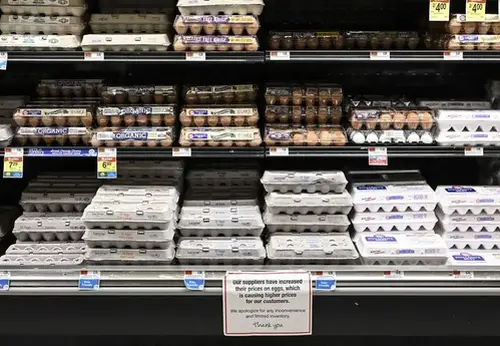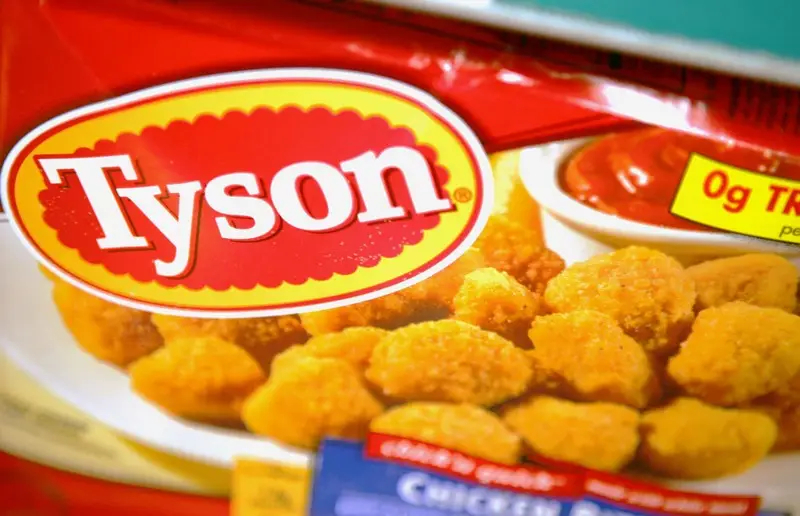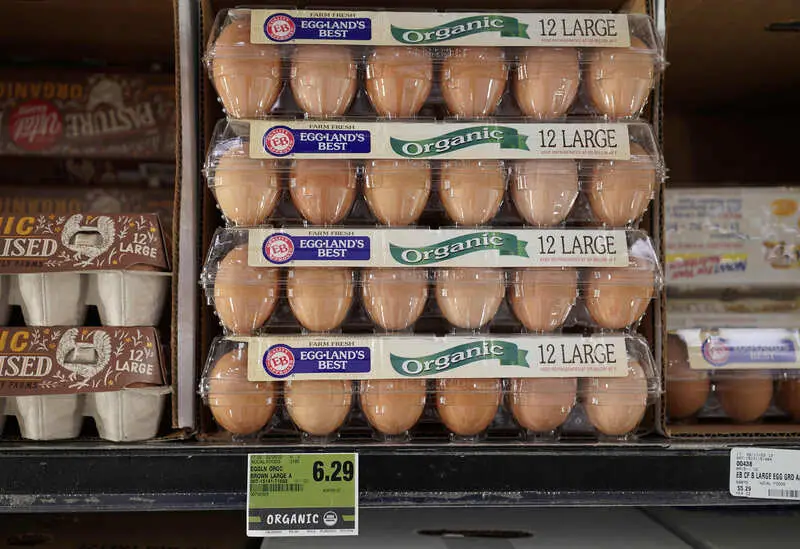
Wholesale egg prices have ‘collapsed.’ Why consumers may soon see relief
Wholesale egg prices have cratered in recent weeks from record highs, meaning consumers may soon see relief at the grocery store.
But the dynamics of egg pricing from the wholesale to retail market, in addition to other factors, means that's not a sure thing in the short term.
related investing news


Prices fell to $2.61 per dozen eggs on Monday — a 52% decrease from the peak around $5.43 on Dec. 19 and a 47% decrease from the beginning of 2023, according to Urner Barry, a market research firm that specializes in the wholesale food industry. Its Midwest Large White Egg price benchmark is a widely cited barometer in the egg industry.
"Prices have collapsed," said Angel Rubio, senior analyst at Urner Barry. "That's a big, big adjustment downward."
Historic bird flu outbreak led to soaring egg prices
In a year characterized by historically high inflation, egg prices were a standout in 2022, rising faster than almost all other consumer items.
Average retail prices increased nearly 60% in 2022, according to the consumer price index.
In December, a dozen large Grade A eggs cost consumers $4.25 on average, more than double the $1.79 a year earlier, according to monthly Bureau of Labor Statistics data.
More from Personal Finance:
Amid inflation, shoppers turn to dollar stores for groceries
Savers poised for big win in 2023 as inflation falls
64% of Americans are living paycheck to paycheck
The U.S. suffered its deadliest outbreak of bird flu in history in 2022, killing millions of birds and significantly disrupting egg supply, according to food economists.
The disease, which is contagious and lethal, affects many types of birds, including egg-laying hens. Cases typically fade by summer, but that didn't happen in 2022; new outbreaks coincided with peak demand around the winter holiday season.
One group, Farm Action, asked the Federal Trade Commission to investigate a possible "collusive scheme" among egg suppliers to keep prices elevated, though food economists largely downplayed that possibility.
"Highly pathogenic avian influenza" ultimately killed about 58 million birds across 47 states, according to the Centers for Disease Control and Prevention. The prior record was set in 2015, when 50.5 million birds died.
Typically, when a case of bird flu is detected, farmers must cull their flocks as a precaution to contain spread of the disease, economists said. It can take months for that farm to start producing and selling eggs again. Meanwhile, buyers must find new suppliers so they can stock shelves — a dynamic that's played out nationwide and raised prices.
Farmers get a reprieve and consumers show 'resistance'
However, there haven't been new bird-flu outbreaks among commercial table-egg laying birds since Dec. 20, according to the U.S. Department of Agriculture.
A prolonged period without setbacks in egg production has given suppliers a reprieve and the market time to recover, said Brian Moscogiuri, global trade strategist at Eggs Unlimited, one of the largest egg suppliers in the U.S.
Consumer demand also typically wanes in January and February, further alleviating price pressures, Moscogiuri said.
The USDA recently cited consumer "resistance to record high prices in grocery outlets across the country" as another reason for the declining and below-average egg demand.
"Wholesale prices have been declining steadily from their late 2022 highs which has helped support retailer efforts to bring pricing down to a more consumer-acceptable level," the USDA said on Feb. 3.

Weekly retail egg data from the USDA is spotty, and it's difficult to see how cratering wholesale prices may be translating in the retail market.
On average, it takes about four weeks for retail prices to reflect wholesale price trends, Rubio said. That means consumers may start to see some relief in February, he said.
Retail prices tend to be less volatile than those at the wholesale level. For every 10% decrease or increase in wholesale egg price, consumers can expect retail prices to shift about 2%, on average, Rubio said.
However, egg demand also generally increases in the weeks preceding Easter, which this year falls on April 9 — making it hard to determine how prices will respond, Rubio said.
There are other factors that may keep retail egg prices elevated for longer, however.
Supermarket chains and other egg retailers don't all peg their shelf prices to movements in wholesale prices, economists said. They may buy eggs from suppliers according to different formulas; some are at least partially tied to the price of corn and soybeans, for example, which represent a big cost to raise and feed chickens, Moscogiuri said.
While prices for those commodities are down from highs following Russia's invasion of Ukraine in early 2022, they remain historically elevated.
Some supermarkets may have tried keeping egg prices down so as not to dissuade consumers from shopping — and may now try to recoup some of their losses before lowering retail prices, Moscogiuri said.
"It's kind of up to the retailer as to how quickly they want to pass prices along," he said.
While bird flu hasn't impacted commercial egg-laying flocks since December, there have been confirmed cases among other types of birds — meaning it's still "a major risk heading into the spring migration," Moscogiuri said. The first case among egg layers last year was detected Feb. 22.






